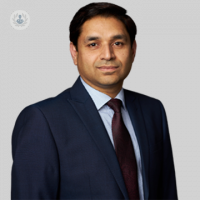Navigating the heart: A comprehensive guide to aortic valve replacement
Written in association with:In his latest online article, Mr Vivek Srivastava gives his insights into aortic valve replacement. He talks about what an aortic valve is, what issues can arise, how a malfunctioning aortic valve can impact health, the treatment options and what aortic valve replacement is.

What is the aortic valve?
The heart possesses four valves responsible for directing blood flow in a singular direction and preventing reverse flow, similar to the function of valves in plumbing. Positioned on the left side of the heart, the aortic valve stands between the heart and the body. It is situated at the base of the primary blood vessel transporting oxygenated blood from the heart's main pumping chamber, branching off to supply various body parts. The aortic valve's role is to facilitate unimpeded blood flow to the body when open and to prevent blood from returning to the heart when closed.
What issues can arise with the aortic valve?
Typically comprising three flaps, the aortic valve may occasionally have two. Generally, it functions effectively throughout a person's life. However, for unknown reasons, some individuals may experience problems with the aortic valve. Ageing can lead to calcium deposits on the valve, rendering the flaps rigid and inflexible, potentially causing obstruction. Conversely, improper closure of the valve may allow blood to leak back toward the heart.
How does a malfunctioning aortic valve impact health?
When the aortic valve malfunctions, either by obstruction or leakage, it can adversely affect heart function. This can manifest in symptoms impacting exercise tolerance and overall quality of life. If left untreated, complications may arise, potentially affecting life expectancy.
What are the options for treating a diseased aortic valve?
The discovery of an abnormal valve during unrelated tests doesn't always necessitate treatment. In the early stages, the heart can often adapt without causing noticeable symptoms. Regular follow-up may be recommended, and medications may be prescribed to help the heart cope with the effects of the diseased aortic valve. However, if the severity of obstruction or leakage causes symptoms or compromises heart function significantly, more drastic interventions become necessary. Traditionally, surgical replacement of the defective valve with an artificial one has been the norm. In recent years, an alternative option known as TAVI (Transcutaneous Aortic Valve Implantation) has emerged as a less invasive procedure.
What is AVR (Aortic Valve Replacement)?
AVR is a cardiac procedure addressing issues with a "diseased" aortic valve, one of the heart's valves regulating blood flow.
Are there alternative treatments for aortic valve issues?
Yes, other options exist, such as repairing the aortic valve or the Ross procedure. However, these procedures are performed in specific situations and are considered uncommon.
Mr Vivek Srivastava is an esteemed cardiothoracic surgeon with over 20 years of experience. You can schedule an appointment with Mr Srivastava on his Top Doctors profile.


